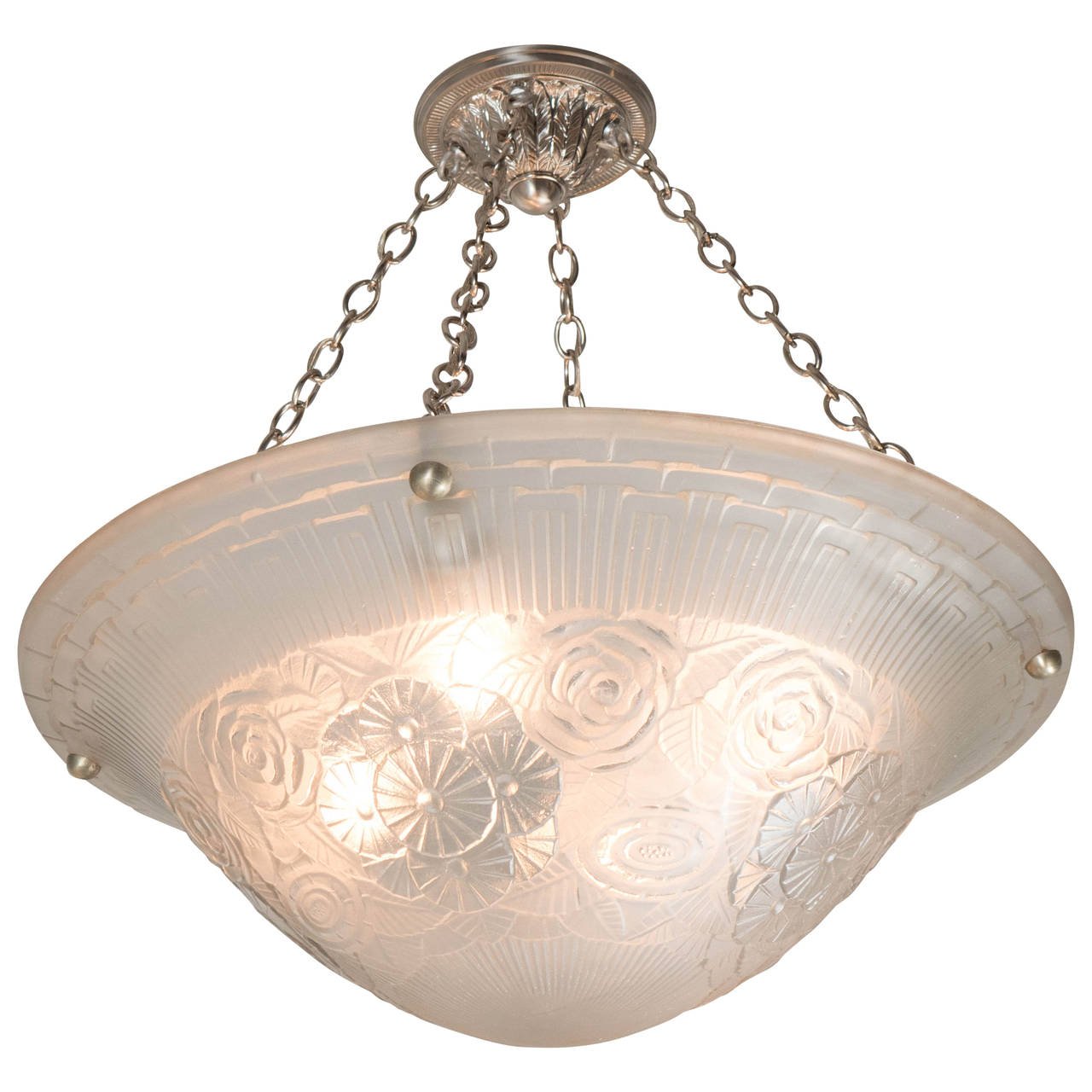Art Deco Frosted Blue Glass Chandelier W/ Brass Fittings Signed ROC by Degué






















Art Deco Frosted Blue Glass Chandelier W/ Brass Fittings Signed ROC by Degué
This strikingly colored and elegant Art Deco Frosted Blue Glass Pendant Chandelier W/ Brass Fittings Signed ROC by Degué originates from France, Circa 1930. Features a round blue molded and frosted glass shade with clusters of blooming flowers surrounded by cubist abstracted leaves and geometric patterning. The shade is suspended by a polished brass canopy and chain with three floral brass fittings spaced equidistantly around the edge of the piece. Signed ROC, a signature used by Degué on some of their fixtures, this Chandelier is a beautiful example of the materials and design characteristics of the Art Deco era. Styles well in a wide array of spaces and settings, from Art Deco to Mid-Century Modernist and Contemporary Interiors. Newly rewired to American Standards with height that can be adjusted to suit. In Excellent Vintage Condition. Accommodates Three Candelabra Based Bulbs offering up to 180 watts of light.
France, Circa 1930
Dimensions:
Height: 12 in (30.48 cm) x Diameter: 13.75 in (34.93 cm)
Power Source: Hardwired
Style: Art Deco (Of the Period)
Materials and Techniques: Brass
Place of Origin: Italy
Period: 1930-1939
Date of Manufacture: circa 1930
Condition: Excellent. Rewired.
Reference Number: LU793440120462
David Guéron ‘DEGUÉ’
David Guéron (1892–1950), a Turkish-born entrepreneur of Spanish Jewish descent, is best known as the visionary behind the celebrated Degué brand of French art glass. His journey to becoming a leading figure in the Art Deco movement is one marked by both personal and professional transformations. Born in Turkey, Guéron fled scandal at the age of 22 by joining the French Foreign Legion in 1914, where he was sent to fight on the Western Front during World War I. After being wounded and receiving a pension, he turned his attention to the world of glassmaking, a field that would eventually bring him significant acclaim.
In the mid-1920s, following the successful Exposition des Arts Décoratifs in Paris, Guéron established his first glassworks factory in Compiègne, a town not far from Paris that had also been a significant site during the Great War. Initially focused on producing functional glassware such as tableware, his real breakthrough came in 1926 when he shifted his focus to high-end French art glass. That same year, Guéron opened the Verrerie d’Art Degué in Paris, a prestigious gallery on Boulevard Malesherbes, which showcased his remarkable glass creations under the brand name "Degué."
Guéron’s work quickly gained recognition for its innovative use of color and decorative techniques. He became known for his bold, colorful vases, lamps, and lighting fixtures, which incorporated cameo glass designs with natural motifs. His designs featured unique decorative elements such as sandblasting, enamel, engraving, and applied glass accents. Among his most popular items were his chandeliers and plaffoniers, ceiling lamps made of translucent, layered glass with intricate swirls of color. Degué glass was highly sought after by wealthy collectors in both France and the United States.
Despite his success, Guéron was not without controversy. In the late 1920s, he was accused of copying the designs of other prominent glassmakers, including Charles Schneider and Muller Frères. A six-year legal battle followed, which financially strained both Guéron's company and his competitors. However, during this time, Degué glass reached new heights of artistic fame through collaborations with talented designers like Edouard Cazaux, who contributed geometric, stylized molded glass patterns to the brand’s collections.
One of Degué’s most prestigious commissions came in the mid-1930s when Guéron's firm was tasked with creating 6,000 handcrafted glass panels for the grand French ocean liner Normandie, a symbol of France's dominance in luxury goods. These exquisite panels, featuring engraved and chiseled designs by renowned glass painter Auguste Labouret, adorned the walls of the ship's public rooms.
Unfortunately, by the late 1930s, the French glass industry was struggling due to economic hardships and labor strikes. The outbreak of World War II in 1939 forced Guéron to shut down his factories. He later fled France for the United States during the war. The grand Normandie ship met a tragic end when it caught fire and capsized in New York Harbor in 1942, though some of the stunning glass panels were salvaged and can still be admired today.
Though Guéron’s career as a glassmaker was cut short by war and financial difficulties, his work continues to be highly valued by collectors of Art Deco glass. Degué pieces, with their vibrant colors and innovative designs, remain enduring symbols of the artistic spirit of the 1920s and 1930s.











